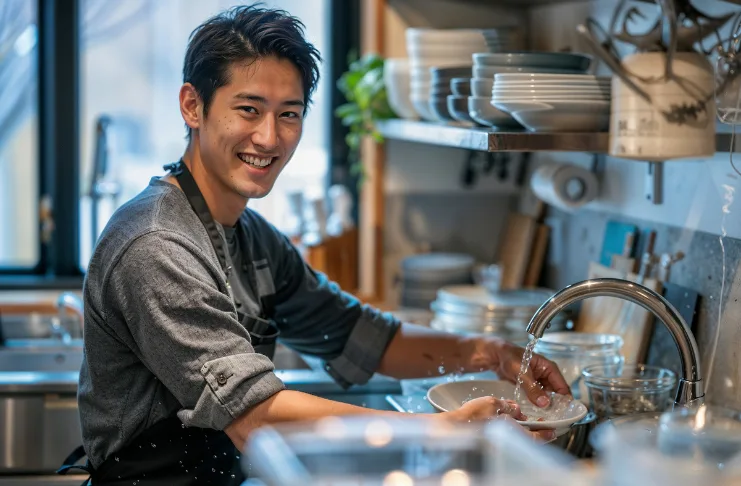Running a restaurant business in Singapore, with effective restaurant management, is both exciting and demanding. With a vibrant F&B scene with more than 29,000 restaurants operating across the city-state, standing out requires more than just good food—it demands operational excellence, strategic foresight, and a relentless focus on customer experience.
In this blog, we’ll dive deep into Singapore restaurant owner duties, explore the daily tasks of restaurant managers, and share actionable insights on how to manage daily restaurant operations in Singapore efficiently.
Understanding the various Singapore Restaurant Owner Duties

The responsibilities of a restaurant manager in Singapore go far beyond the kitchen. Whether you own a cozy hawker-style eatery or a high-end fine-dining venue, your role is central to every aspect of the business. Here’s a breakdown of the key responsibilities in detail:
1. Business Strategy & Vision
As a restaurant owner, you’re the visionary. You’re responsible for defining the business concept, positioning, and long-term growth goals. In Singapore’s competitive scene, identifying a niche—whether it’s plant-based cuisine, fusion dishes, or experiential dining—is crucial.
INDUSTRY INSIGHT
| Singapore’s food and beverage (F&B) industry continues to demonstrate strong momentum, driven by rising consumer demand, evolving dining trends, and digital transformation. According to the Singapore Department of Statistics, the total sales value of F&B services in February 2025 reached approximately SGD 961 million. This marks a significant growth from earlier estimates and underscores the resilience and scalability of the sector in a post-pandemic economy. |
2. Navigating Licensing & Regulatory Compliance
Singapore is strict when it comes to health and safety regulations in F&B. Every restaurant must comply with:
- SFA Food Shop Licence
- Workplace Safety Regulations
- Halal Certifications (if applicable)
- NEA cleanliness grading
- Fire Safety Certificates
Use the GoBusiness Licensing Portal to streamline the process.
3. Financial Management & Budgeting
One of the most critical duties is managing restaurant finances, like cash flow, budgeting, and profitability. As the owner, you must:
- Monitor daily sales reports
- Track the cost of goods sold (COGS)
- Manage payroll and vendor payments
- Review profit and loss (P&L) monthly
Operating a restaurant in Singapore presents unique financial hurdles. High rental costs, intense competition, and stringent labor regulations can impact profitability.
4. Daily Operations Oversight
The question, “What are the daily tasks of restaurant owners in Singapore?” is often asked. A typical day may include managing tasks during busy service periods :
- Opening inspections (cleanliness, stock, staff readiness)
- Briefing the team on goals or menu specials
- Ensuring smooth kitchen and floor operations
- Troubleshooting guest issues
- Coordinating deliveries and vendor check-ins
- Reviewing reservations and feedback
Owners often clock 12+ hours daily, especially during peak periods and weekends.
5. Staff Hiring, Training & Retention
Your team is your greatest asset. In Singapore, where service quality is king, training staff on SOPs, customer service, and hygiene standards is non-negotiable.
Must-Dos:
- Conduct regular performance reviews
- Invest in skills upgrading (WSQ courses)
- Promote a positive and inclusive work culture
The quarterly average turnover rate for Singapore’s F&B industry was approximately 2.4%, with the highest quarterly average in the past five years reaching 3.3% in 2020
6. Customer Experience Management
In Singapore’s review-driven culture, food quality and reputation can make or break a restaurant. How owners improve customer satisfaction:
- Engage with diners personally
- Monitor Google, TripAdvisor & Grab reviews
- Offer loyalty programs
- Handle complaints promptly
When you maintain service quality, your guests feel valued, they return, leave glowing reviews, and become your best marketing ambassadors.
7. Supply Chain & Vendor Management
Restaurant owners must maintain strong relationships with suppliers to ensure:
- Timely delivery of fresh ingredients
- Cost-effective bulk procurement
- Backup vendors for emergencies
Consider joining the Singapore Agro-Food Enterprises Federation to source locally and sustainably.
8. Menu Planning & Engineering
You’ll need to analyze menu performance regularly. Look into:
- What sells the most (stars)
- High-margin items (plowhorses)
- Low-performing dishes (dogs)
Use menu engineering softwares to make data-backed decisions.
9. Embracing Restaurant Tech
To stay competitive, a restaurant manager must leverage tools for improving operational efficiency :
- POS systems (e.g., EPOS, Revel)
- Inventory tracking
- Online ordering integrations
- QR-based menus
- Staff scheduling apps
Leveraging the right tools can save time, cut costs, and elevate both your back-end efficiency and front-end service.
10. Marketing & Promotions
A great restaurant without footfall is a missed opportunity. Owners are typically involved in:
- Social media content planning
- Influencer outreach
- Seasonal promotions
- Collaborations with delivery platforms like GrabFood & Foodpanda
Smart promotions and consistent branding can help you stand out in a crowded market and keep customers coming back.
11. Compliance with Sustainability Standards
With Singapore pushing its Green Plan 2030, health and safety standards and eco-conscious practices matter. Recommended actions:
- Switch to biodegradable packaging
- Reduce food waste via apps like Treatsure
- Track carbon footprint (e.g., via Unravel Carbon tools)
Making green choices can strengthen your brand, reduce waste, and even lower long-term operational costs.
12. Crisis Management & Contingency Planning
Whether it’s a food poisoning scare or a power outage, a restaurant manager must always be prepared. Build SOPs for:
- Health emergencies
- Equipment breakdown
- PR crisis or negative reviews
With the right contingency plans, you can respond calmly, recover quickly, and protect your team, guests, and brand image.
13. Analyzing Business Performance
On a weekly or monthly basis, review KPIs such as:
- Revenue per seat/hour
- Average table turnover rate
- Online sentiment score
- Staff productivity
Use dashboards like F&B Analytics by IMDA for visual reports and decision-making.
14. Networking & Industry Engagement
Stay updated with trends and connect with fellow owners through:
- Restaurant Association of Singapore (RAS)
- FHA-HoReCa Expo
- Local F&B business forums
This helps in partnership opportunities and staying ahead in innovation.
15. Understanding Labour & Immigration Laws
If you’re hiring foreign workers in Singapore’s F&B sector, it’s essential to comply with the Ministry of Manpower (MOM) regulations, including quota limits, levy payments, and valid work pass requirements such as the S Pass or Employment Pass. Failure to meet these legal obligations can lead to severe penalties, including hefty fines, revocation of work permits, or even suspension of your restaurant license.
16. Community Building & Local Engagement
Contributing to the local neighborhood can enhance brand loyalty. Examples:
- Sponsor local events
- Partner with schools or NGOs
- Offer internship programs with ITE or SHATEC
Community engagement builds loyal customers, strengthens your brand identity, and contributes to local goodwill.
17. Innovating for Changing Consumer Behavior
Post-pandemic, trends like plant-based menus, DIY meal kits, and cloud kitchens are growing. Adapt by:
- Introducing flexible dining concepts
- Partnering with meal delivery subscription services
- Exploring ghost kitchens for cost-saving
Staying agile and trend-aware allows your restaurant to serve fresh experiences that resonate with modern diners.
18. Balancing Passion with Profit
Running a restaurant in Singapore is a test of endurance and heart. While passion drives you, smart management ensures sustainability. Successful owners blend:
- Visionary thinking
- Relentless execution
- Data-backed decisions
- People-first leadership
Marrying heart with hustle ensures your dream not only survives but thrives—financially and creatively.
Conclusion
With a bustling F&B market, restaurant management faces the challenge of standing out in a highly competitive and quality-driven environment in the restaurant industry. Beyond offering great food, they must manage day-to-day operations, lead teams, ensure financial sustainability, and maintain compliance with the country’s strict food and safety regulations. Singapore restaurant manager duties extend far beyond the kitchen—they include everything from strategic planning and vendor management to customer engagement, marketing, and adapting to changing consumer preferences.
Whether you’re planning to open your first outlet or are a seasoned restaurateur aiming to scale, understanding the daily tasks of a restaurant manager in Singapore and learning how to manage a restaurant in Singapore effectively are key to long-term success.
Frequently Asked Questions
1. What is the job description of a restaurant owner?
A restaurant manager is responsible for overseeing all aspects of the business, including operations, finances, staffing, marketing, customer service, and regulatory compliance to ensure smooth and profitable functioning.
2. Why is it hard for restaurant owners to do well in Singapore?
High rental costs, strict regulations, intense competition, staffing challenges, and rapidly changing consumer preferences make it difficult for a restaurant manager to sustain long-term success in Singapore.
3. What are the duties and responsibilities of a restaurant manager?
A restaurant manager handles daily operations, supervises staff, ensures customer satisfaction, maintains hygiene standards, manages inventory, and supports the owner in achieving business goals.
4. What are the duties of a dining room owner?
A dining room owner ensures guest satisfaction, maintains ambience and cleanliness, manages front-of-house staff, and coordinates with the kitchen for timely service.
5. What are the duties of a restaurant owner?
A restaurant owner sets the business vision, manages finances, oversees staff and operations, maintains vendor relationships, ensures compliance, and drives customer loyalty and growth.
6. What is the purpose of a restaurant owner?
The purpose of a restaurant manager is to lead the business strategically, ensuring it delivers quality food, service, and profitability while building a strong brand and loyal customer base.
7. What will be your daily job duties as owner of a restaurant?
Daily duties include reviewing sales reports, supervising staff, handling customer feedback, checking inventory, ensuring cleanliness, and making operational decisions.
8. What is the role of a restaurant owner?
The role involves leadership, decision-making, strategic planning, financial control, and ensuring the restaurant aligns with its brand and goals.
9. What is the daily routine of a restaurant manager?
A restaurant manager’s routine includes staff briefings, floor supervision, handling guest issues, checking inventory, coordinating with the kitchen, and closing daily reports.
10. Is a restaurant profitable in Singapore?
Yes, but profitability depends on location, concept, cost control, service quality, and marketing. Many struggle with high overheads and narrow margins.
11. Can foreigners open restaurants in Singapore?
Yes, foreigners can open restaurants in Singapore, provided they register a business with ACRA and obtain the required food and operational licenses.





